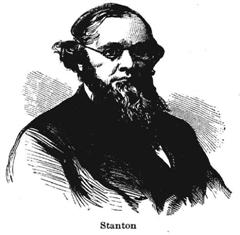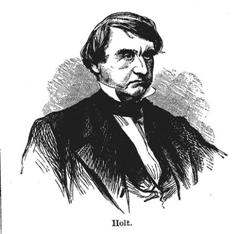 and
learned from his family of his appointment. Knowing the character of the bold,
bad men, then in the ascendency in the Cabinet, he determined at once to
decline; but when, the next day, he announced his resolution at the White
House, the entreaties of the distressed and helpless President, and the
arguments of Mr. Black, moved him to accept.
and
learned from his family of his appointment. Knowing the character of the bold,
bad men, then in the ascendency in the Cabinet, he determined at once to
decline; but when, the next day, he announced his resolution at the White
House, the entreaties of the distressed and helpless President, and the
arguments of Mr. Black, moved him to accept. The next meeting was a long and stormy one, Mr. Holt, feebly seconded by the
President, "urging the immediate reinforcement of Sumter, while Thompson,
Floyd and Thomas contended that a quasi-treaty had been made by the officers
of the
Government with the leaders of the rebellion, to offer no resistance to their
violations of law and seizures of Government property. Floyd, especially,
blazed with indignation at what he termed the "violation of honor." At last,
Mr. Thompson formally moved that an imperative order be issued to Major
Anderson to retire from Sumter to Fort Moultrie—abandoning Sumter to the
enemy, and proceeding
to a post where he must at once surrender. Stanton could sit still no longer,
and rising, he said with all the earnestness that could be expressed in his
bold and resolute features:
The next meeting was a long and stormy one, Mr. Holt, feebly seconded by the
President, "urging the immediate reinforcement of Sumter, while Thompson,
Floyd and Thomas contended that a quasi-treaty had been made by the officers
of the
Government with the leaders of the rebellion, to offer no resistance to their
violations of law and seizures of Government property. Floyd, especially,
blazed with indignation at what he termed the "violation of honor." At last,
Mr. Thompson formally moved that an imperative order be issued to Major
Anderson to retire from Sumter to Fort Moultrie—abandoning Sumter to the
enemy, and proceeding
to a post where he must at once surrender. Stanton could sit still no longer,
and rising, he said with all the earnestness that could be expressed in his
bold and resolute features: